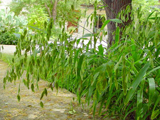Native Plants

Q. Who is Mr. Smarty Plants?
A: There are those who suspect Wildflower Center volunteers are the culpable and capable culprits. Yet, others think staff members play some, albeit small, role. You can torture us with your plant questions, but we will never reveal the Green Guru's secret identity.
Did you know you can access the Native Plant Information Network with your web-enabled smartphone?
Ask Mr. Smarty Plants is a free service provided by the staff and volunteers at the Lady Bird Johnson Wildflower Center.

rate this answer
Saturday - May 04, 2013
From: Simpsonville, SC
Region: Southeast
Topic: Privacy Screening, Shade Tolerant, Grasses or Grass-like, Herbs/Forbs, Shrubs, Trees
Title: Privacy screen from Simpsonville SC
Answered by: Barbara Medford
QUESTION:
My neighbor cut down his part of our shared woods so now we see his whole "outside patio area". What kinds of fast growing shade loving trees and shrubs can we plant on our property line that will completely block our view of him?ANSWER:
Before we begin, let us give you some caveats (that means we can't do everything you want us to)
1. The Lady Bird Johnson Wildflower Center is committed to the growth, propagation and protection of plants native not only to North America but also to the area in which those plants have evolved; in your case, Greenville Co., northeastern South Carolina. This helps ensure that plants chosen are already accustomed to climate, soils and rainfall when you plant them.
2. Fast-growing woody plants (trees and shrubs) tend to be short-lived. The speed of growth can depend on the amount of sunlight, the soil and temperature.
3. Completely blocking out a view would probably take years to achieve. We suggest a group of different types of plants, with different heights and textures, to distract the eye and focus on the attractiveness of the plants nearer the viewer.
With all that in mind, we will go to our Native Plant Database, scroll down to Combination Search, select South Carolina on the drop-down menu for State, "tree" under Habit, and "part shade" (2 to 6 hours of sun a day) under Light Requirements. We will run succeeding searches with "shrub," "grass" and "herb" (herbaceous blooming plant) under Habit, leaving other specifications the same. We will check to ascertain that each plant we select does grow natively in your area. You can follow each plant link on our list to our webpage on that plant to determine growing conditions, soil moisture and type, etc. There were many more selections in each category, so we invite you to utilize the database and go looking for plants that suit you better.
Trees for Northeastern South Carolina:
Juniperus virginiana (Eastern red cedar)
Prunus angustifolia (Chickasaw plum
Vaccinium arboreum (Farkleberry)
Shrubs:
Kalmia latifolia (Mountain laurel)
Rhododendron maximum (Great laurel)
Herbaceous Blooming Plants:
Agalinis purpurea (Purple false foxglove)
Aruncus dioicus (Bride's feathers)
Grasses or Grass-like:
From the Image Gallery
More Herbs/Forbs Questions
Drought stressed wooly butterflybush in Atlanta, TX
September 24, 2011 - My butterfly bush is dead looking from the drought. Do you think there is a chance it just went dormant and will return next year. I am still putting water on it. I believe it is a white wooly butterf...
view the full question and answer
Green wall panel for Dallas
August 21, 2007 - We are working on a green wall panel for a hotel near SMU--I see your list of recommended species for green roofs, & wondered if you have any ideas for vertical applications. Probably will have someth...
view the full question and answer
The origin of Juncus effusus var. Big Twister
May 04, 2008 - Juncus effusus, var. 'Big Twister' We're trying to figure out the nativity of this thing, and whether it is safe to plant in our very wet rain garden. Thank you for any assistance...
view the full question and answer
Native plants for southwest exposure in Tulsa OK
April 24, 2008 - I want to plant something in a bed on the South side of my house with some Western exposure. The space is in a bed that would share space with a Red Tip Photinia (next to the house)& liriope( on the ...
view the full question and answer
Looking for seeds for Carex texensis and Horse Herb
July 27, 2014 - I am looking for either plants or seeds of Carex texensis and horseherb with no success. I live in the Albuquerque,NM mountain region (at ~6800ft, zone 6). I need something that is very dought resis...
view the full question and answer
| Support the Wildflower Center by Donating Online or Becoming a Member today. |

